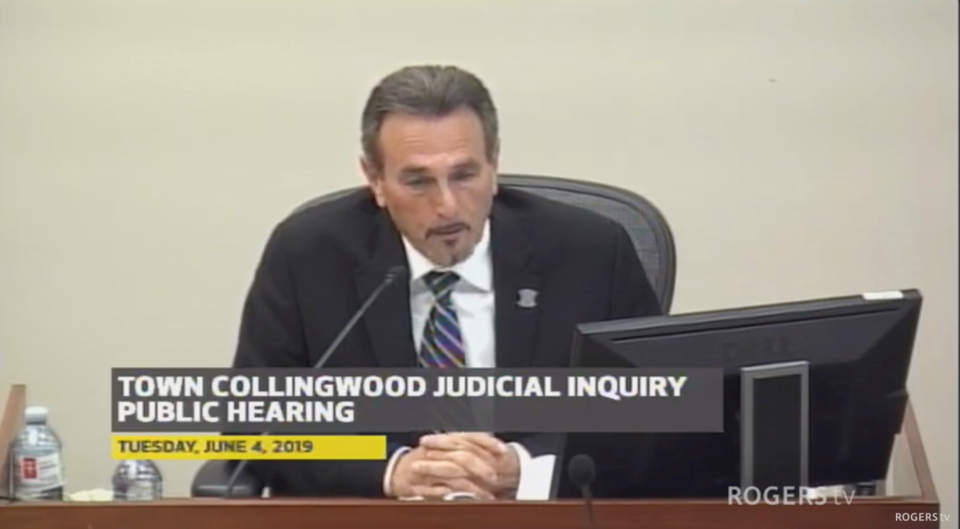A judge has ordered Collingwood’s electricity distribution company, Epcor, to pay legal fees for Ed Houghton, the former CEO of Collus PowerStream, during the second phase of the Collingwood Judicial Inquiry.
However, the case is ongoing and remains before the Ontario Superior Court of Justice.
Judge J. Koehnen released a ruling on Sept. 19, 2019, on a civil suit brought forward by Houghton to request Epcor cover his legal fees for both part one and part two of the Collingwood judicial inquiry.
A previous request made by Houghton to Epcor on Sept. 20, 2018, was denied by Epcor.
The Collingwood Judicial Inquiry was called in February 2018 to look into the 2012 sale of 50 per cent of Collus to PowerStream. At the time, Houghton was president and CEO of Collus, and held the position after the sale under CollusPowerStream.
Earlier this year, Epcor purchased CollusPowerStream.
The second part of the inquiry, which is currently in public hearings, is focused on the allocation of proceeds from the sale.
Houghton was acting chief administrative officer (CAO) for the town of Collingwood during the time (2012 and 2013) council was making decisions on how to spend the proceeds from the 2012 share sale. He was also CEO of PowerStream for that time.
Houghton has testified he was not paid an extra income for his role as acting CAO.
This civil suit between Houghton and Epcor is separate from the Judicial Inquiry.
According to the bylaws established by Corporations Canada, a corporation shall indemnify (compensate) a former director or officer against all costs incurred with respect of any civil, criminal, or administrative action or proceeding to which he is made a party by reason of being or having been a director or officer of the corporation if he has acted honestly and in good faith with a view to the best interests of the corporation.
According to Koehnen’s ruling, Epcor objected to paying Houghton’s fees because Houghton was not participating in the second phase of the inquiry because of his role with CollusPowerStream, but because of his role as acting CAO of the town.
Second, Epcor calls into question the extent to which Houghton was acting “honestly, in good faith and in the best interests of the corporation.”
“An officer or director is deemed to be acting honestly until proven otherwise,” states the judge in his ruling. “So far, Epcor has introduced no evidence to suggest that Mr. Houghton was acting improperly.”
During the first phase of the inquiry, Houghton was on the witness stand and his lawyer for the inquiry, Fred Chenoweth, received special permission to be the first to question Houghton on the stand. The first questions typically come from the inquiry’s counsel.
At the time, Houghton stated in an affidavit he was concerned about the potential of a notice of misconduct being issued to him by the commission.
A notice of misconduct is a confidential memo issued to an individual throughout an inquiry to let them know the commissioner - in the final report at the close of the inquiry - may comment adversely on the conduct of a person, corporation, institution or government.
Based on Judge Koehnen’s ruling, there was a notice of possible misconduct issued; Judge Koehnen has seen the confidential letter.
“The notice of possible misconduct is, at this stage, no more than a statement of allegations,” states Justice Koehnen. “I have reviewed the inquiry’s notice carefully. The allegations it contains could, if true, result in findings that Mr. Houghton was not acting honestly. On the other hand, they could also result in findings that might fall short of the ideal to which we aspire in municipal government, but not fall short of honesty.”
Justice Koehnen ruled Houghton should not have to wait until the end of the inquiry to receive his legal fees from Epcor. He ordered them paid now, but said Houghton would have to repay the fees if he is ultimately found not to have acted honestly, or if it turns out his participation in the second phase of inquiry hearings was due to his role as a director or officer of PowerStream.
“Mr. Houghton has a legitimate interest in participating in the inquiry. He has a legitimate need for legal representation. His legal costs are already significant,” states Justice Koehnen. “The mere allegation of dishonesty cannot tip the equitable balance against Mr. Houghton.”
While the inquiry continues, Koehnen said Epcor can bring evidence to him to support their claim Houghton should not receive legal fees for his participation in the inquiry.
The judge also stated he would not be asking Epcor to pay for Houghton’s legal bills accumulated in the first phase of the inquiry because Houghton waited until late July 2019 to file the civil suit despite having his request for legal fees denied by Epcor in September 2018.
Justice Koehnen said he would deal with Houghton’s first phase fees at a later stage, when Epcor has filed a response to Houghton’s application before the court.

